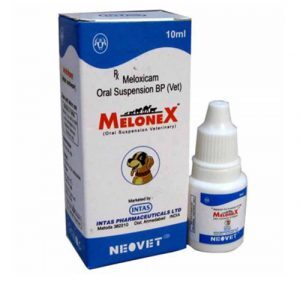Table of Contents
Melonex Oral Suspension is a medication designed to address pain and inflammation associated with conditions like rheumatoid arthritis, gout, and osteoarthritis in adult dogs, with meloxicam as its active ingredient.

What Is Melonex Oral Suspension?
Melonex Oral Suspension is a medication with meloxicam as its active ingredient. It functions as a non-steroidal anti-inflammatory drug (NSAID) and analgesic, effectively alleviating pain. This pharmaceutical is primarily prescribed for managing conditions such as osteoarthritis, rheumatoid arthritis, and juvenile rheumatoid arthritis, offering relief from pain, swelling, fever, and redness.
Ingredients
Each ml of Melonex Oral Suspension contains
- Meloxicam BP – 1,5 mg;
- Aqueous base – q.s.
Dosage Sizes
|
Body Weight (kg) |
Initial Dose (ml) |
Maintenance Dose (ml) |
|
7 kg |
1 ml |
0.47 ml |
|
15 kg |
1 ml |
1 ml |
|
30 kg |
1 ml |
2 ml |
|
50 kg |
1 ml |
3.33 ml |
This table illustrates the initial dose of 1 ml for every 7 kg of body weight on the first day and the maintenance dose of 1 ml for every 15 kg of body weight after that. You can adjust the values accordingly based on the patient’s specific weight.
Important Safety Information for Pet Owners
Melonex Oral Suspension is a medication designed to relieve pets suffering from pain and inflammation. To ensure the well-being of your furry friend, it is crucial to be aware of the following safety information.
Melonex Oral Suspension should only be administered to your pet under the guidance and prescription of a qualified veterinarian. Only use this medication with proper veterinary consultation.
Ensure precise dosing according to your veterinarian’s instructions. The dosage should be based on your pet’s specific weight and condition. Do not attempt to diagnose or treat your pet’s condition independently. Always rely on professional veterinary advice for proper diagnosis and treatment planning. Use Melonex Oral Suspension for the duration prescribed by your veterinarian. Do not discontinue the medication without their recommendation, as this could affect your pet’s recovery.
Keep a close eye on your pet while they are on Melonex Oral Suspension. Monitor for any adverse reactions or changes in behavior, and report them promptly to your veterinarian. Be aware of potential side effects such as gastrointestinal upset, changes in appetite, or allergic reactions. Contact your veterinarian if any of these symptoms occur.
Inform your veterinarian about any other medications or supplements your pet is taking to ensure there are no adverse drug interactions.
Inform your veterinarian if your pet has a history of allergies, especially to non-steroidal anti-inflammatory drugs (NSAIDs).
If you notice any unexpected or severe side effects, report them to your veterinarian and the medication manufacturer as appropriate.
Veterinary Prescription
Melonex Oral Suspension contains meloxicam, a prescription medication for pets in many countries. In most cases, you would need a veterinary prescription to purchase Melonex Oral Suspension for your pet.
However, regulations regarding prescription requirements for pet medications may vary from one region or country to another, and they can change over time. Therefore, you must check with your local veterinary clinic or a licensed pharmacist to understand your area’s current requirements and regulations. They can provide the most up-to-date information on whether a prescription is needed to obtain Melonex Oral Suspension for your pet.
Interactions
Interactions with medications, substances, or medical conditions can affect the safety and efficacy of Melonex Oral Suspension (which contains meloxicam) in both humans and pets. It’s crucial to be aware of potential interactions and consult a veterinarian before starting this medication. Here are some common interactions to consider:
- Other Non-steroidal Anti-Inflammatory Drugs (NSAIDs): Combining Melonex Oral Suspension with other NSAIDs, such as aspirin or ibuprofen, can increase the risk of gastrointestinal ulcers and bleeding. It’s essential to avoid concurrent use of multiple NSAIDs.
- Anticoagulants (Blood Thinners): Meloxicam may enhance the effects of blood-thinning medications like warfarin, increasing the risk of bleeding. Close monitoring and dosage adjustments may be necessary if these medications are used together.
- Corticosteroids: Concurrent use of corticosteroids and Melonex Oral Suspension can increase the risk of gastrointestinal side effects. Your veterinarian may adjust the treatment plan if your pet requires both medications.
- Diuretics (Water Pills): Meloxicam can reduce the effectiveness of diuretics, potentially leading to an increase in blood pressure. Your veterinarian may need to closely monitor your pet’s condition if these medications are used together.
- Other Medications: Inform your veterinarian about all medications, supplements, and herbal products your pet is taking, as interactions may occur. This includes medications for chronic conditions, heart problems, or other health issues.
- Kidney or Liver Problems: Melonex Oral Suspension is metabolized primarily by the liver and excreted through the kidneys. If your pet has pre-existing kidney or liver problems, the dosage or choice of medication may need adjustment.
- Dehydration: Dehydrated pets may be more susceptible to kidney problems when taking NSAIDs like meloxicam. Ensure your pet has access to an adequate water supply while on this medication.
- Age and Health Status: Your pet’s age and overall health can impact the risk of interactions. Older pets or those with existing health issues may be more vulnerable to side effects and interactions.
- Allergies: Inform your veterinarian of any known allergies or sensitivities your pet has to medications or substances.
- Pregnancy and Lactation: Discuss with your veterinarian if your pet is pregnant, nursing, or planning to breed, as using Melonex Oral Suspension in these situations may require special consideration.
Always follow your veterinarian’s guidance regarding the safe use of Melonex Oral Suspension for your pet. Be sure to inform them of all medications and health conditions your pet may have to minimize the risk of potential interactions and ensure the best possible treatment outcome.

Side Effects
Melonex Oral Suspension can have side effects in pets. Here are some common side effects associated with Melonex Oral Suspension in pets:
- Gastrointestinal Upset: One of the most common side effects may include symptoms such as vomiting, diarrhea, or decreased appetite. It’s essential to monitor your pet’s eating and bowel habits while they are on this medication.
- Ulcer Formation: Melonex Oral Suspension can lead to the development of stomach ulcers or gastrointestinal bleeding. Symptoms may include black, tarry stools or bloody vomit. If you notice these signs, contact your veterinarian immediately.
- Kidney Issues: In rare cases, NSAIDs like meloxicam can affect kidney function. Signs of kidney problems may include increased thirst, increased urination, or changes in urine color or volume.
- Liver Enzyme Changes: Some pets may experience changes in liver enzyme levels, which can be detected through blood tests. Your veterinarian may monitor liver function while your pet is on this medication.
- Allergic Reactions: While uncommon, allergic reactions can occur and may manifest as hives, itching, facial swelling, or difficulty breathing. Seek immediate veterinary attention if you suspect an allergic reaction.
- Behavioral Changes: Some pets may exhibit changes in behavior, such as restlessness or lethargy. Monitor your pet’s behavior for any unusual signs.
- Swelling or Fluid Retention: In rare cases, pets may experience swelling or fluid retention, leading to edema or weight gain. Notify your veterinarian if you observe these symptoms.
- Changes in Blood Pressure: Meloxicam can affect blood pressure, and in some cases, it may lead to increased blood pressure. Your veterinarian may monitor blood pressure as needed.
- Other Symptoms: Less commonly, pets may experience additional side effects such as changes in appetite, decreased activity, or changes in coat condition.
If you notice any concerning symptoms or changes in your pet’s health while they are taking Melonex Oral Suspension, contact your veterinarian promptly.
Overdose
An overdose of Melonex Oral Suspension in pets can be severe and should be treated as a medical emergency. If you suspect your pet has ingested too much of this medication, immediately contact your veterinarian or an emergency veterinary clinic. Signs of an overdose may include:
- Frequent or severe vomiting can be an early sign of an overdose.
- Excessive or severe diarrhea may occur.
- Your pet may refuse to eat or show a significant decrease in appetite.
- An overdose can cause extreme tiredness or weakness.
- In severe cases, an overdose can lead to stomach ulcers, manifesting as black, tarry stools or bloody vomit.
- An overdose can potentially harm the kidneys or liver, leading to symptoms such as increased thirst, increased urination, or changes in urine color or volume.
- In rare cases, an overdose may result in neurological symptoms like seizures or disorientation.
If you are unsure whether your pet has ingested an overdose but notice any unusual symptoms or changes in behavior, it’s essential to seek immediate veterinary attention. Your veterinarian will perform a thorough examination, assess your pet’s condition, and provide appropriate treatment.
Treatment for an overdose of Melonex Oral Suspension may include inducing vomiting, administering activated charcoal to reduce the absorption of the medication, providing intravenous fluids to maintain hydration and support kidney function, and addressing any specific symptoms or complications that may arise.
The best course of action in an overdose is to promptly contacting a veterinarian.
Storage
Store Melonex Oral Suspension at room temperature, ideally between 20°C to 25°C (68°F to 77°F). Avoid exposing it to extreme heat or cold, as temperature fluctuations can affect the stability of the medication. Store the medication in its original container to protect it from light, as exposure to light can degrade the active ingredients. Keep the container in a dark place or use an opaque storage bag or box if necessary.
Ensure that the oral suspension bottle is tightly closed when not in use. This helps prevent contamination and maintains the quality of the medication.
Store Melonex Oral Suspension in a location inaccessible to children and pets to prevent accidental ingestion.
Keep the container away from excessive moisture, as it can cause the medication to deteriorate. Do not store it in the bathroom or any humid environment.
Keep the medication in its original container with the provided measuring device. Do not transfer it to another container, which can lead to dosing errors.
FAQ
Is Melonex Oral Suspension available over-the-counter for pets?
No, Melonex Oral Suspension is typically available by prescription only. It should be administered to your pet under the guidance of a veterinarian.
How is Melonex Oral Suspension administered to pets?
The medication is typically administered orally by measuring the prescribed dose using the provided dropper or syringe and then mixing it with your pet’s food or directly into their mouth.
Can I give Melonex Oral Suspension to my cat if it’s prescribed for my dog?
No, the dosage and formulation of Melonex Oral Suspension can differ between dogs and cats. It is crucial to use the medication as prescribed for your specific pet.
Can I discontinue Melonex Oral Suspension if my pet’s symptoms improve?
No, following your veterinarian’s prescribed treatment plan and completing the entire course of medication is essential, even if your pet’s symptoms improve before the medication is finished.
Can Melonex Oral Suspension be used in pregnant or nursing pets?
Use during pregnancy or nursing should be discussed with your veterinarian, as it may require special consideration.

































